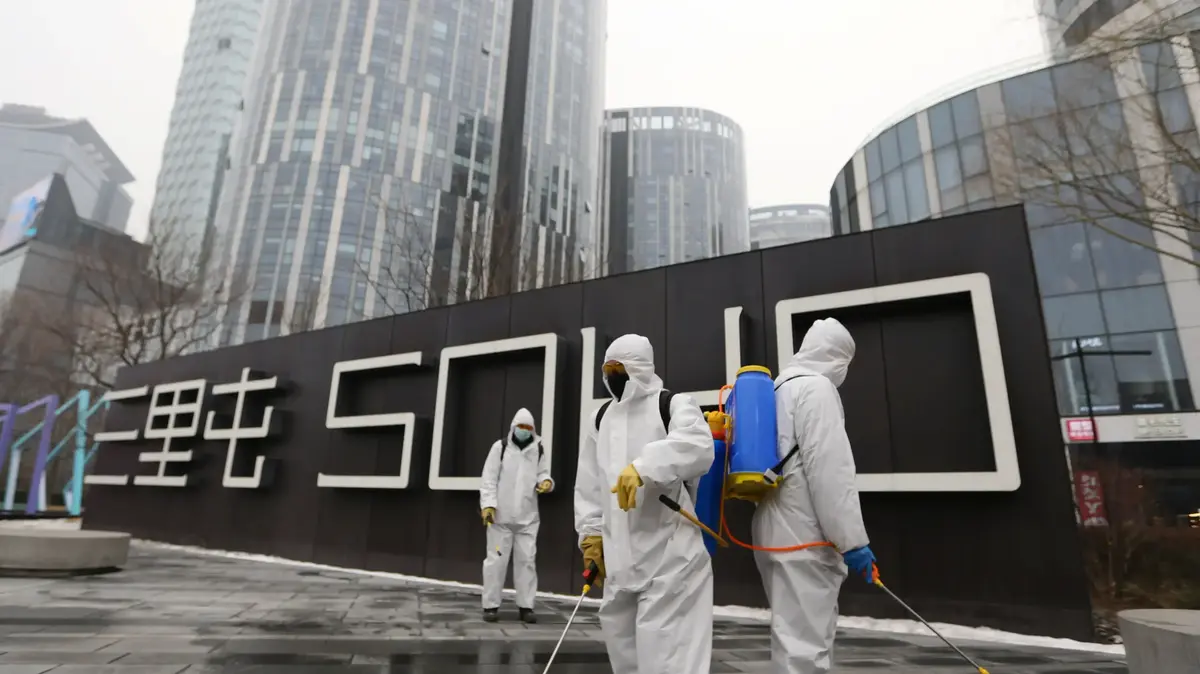This is how Chinese workers' lives look like in the shadow of the virus
Photo: Reuters
- news
- News in the world
- Asia and the Pacific
Employees eat in isolation and wear masks and helmets, networking and non-face-to-face meetings and robots hand out meals to reduce the possibility of infection - tens of millions returning to their workplaces - but to a different reality. "It's not normal"
Reuters
14/02/2020Jin Yang, a government official in China, returned to his job in Beijing this week to find him completely different, in the shadow of the fight against the spread of the new corona virus. His office has stopped with the custom of the cafeteria lunches, for home-cooked meals eaten on the desktop.
"It's not normal," he told Reuters.
Instead of face-to-face meetings, meetings are held online, and all employees must wear masks throughout the day and report their heat measurements twice a day.
More in Walla! NEWS
Has been quarantined in hospital for fear of being infected with corona - and escaped from police 254 dead in deadly day in China; first victim in Japan in corona panic: Foreign Ministry prepared to rescue Israelis from ship in Japan Private health insurance policies that will change your lifeBody heat test for Jin Young. Beijing (Photo: Reuters)
Heat tests for Jin Young, government official, Beijing, China, February 10, 2020 (Photo: Reuters)
Gene is one of millions of workers who started flowing back to their workplaces this week, with the end of a 10-day New Year's holiday in an effort to curb the virus, which killed 1,380 people and infected nearly 64,000.
However, the streets and subways remain largely deserted in major cities such as Beijing Capital and Shanghai, the country's business hubs. Many shops and restaurants stand empty or closed, while many workers remain in homes.
Because many places still enforce containment measures, companies are adopting regulations to prevent contagion while trying to alleviate workers' concerns, as far as possible between them.
Not all companies returned to work. Many ask employees who return from overseas trips or other districts to stay in the home for 14 days.
An executive at a multinational company said anonymously that the workforce is concerned, especially after the closure imposed by authorities on Wuhan, the capital of the Hubei district and the epidemic outbreak of the virus, which numbers 11 million.
More in Walla! NEWS More in Walla! NEWS121 more dead in China Corona virus; More than 1,700 medical professionals were infected
To the full article"They don't want any contact," the principal said. "There are those who want people to sit with empty chairs between them at meetings, to allocate set times for visits to the toilet, and without distributing the water facility."
"It's not normal". Jin Yang eats in his office in Beijing (Photo: Reuters)
Jin Yang, Government Employee, Beijing, China, February 10, 2020 (Photo: Reuters)
Pictures in the cafeteria in China were published in one of the offices, where plastic sheets and wooden boards were placed to divide the tables to create separate dining rooms. In the industrial area of Changsha, robots began to use to distribute meals.
The automaker GAC, which runs joint ventures with Toyota and Honda, said only about half of its employees are allowed to work every day at its headquarters in southern Guangzhou, with lunch times divided into four 15-minute segments each. She also rearranged her sideboard, moving tables to an outdoor porch with each one two feet apart. She also switched the previous buffet to a pre-set menu.
Robot distributes meals in Changsha industrial area (Photo: Twitter)
Robot distributes food in an industrial area in Changsha City, China, February 2020 (Photo: Twitter, official website)
At Pindodo e-commerce company, employees must fill out a daily health form. It disinfects the offices at least twice a day, providing meals for everyone to minimize possible exposure to the virus.
In the Wiboo messaging app, the term "hard armor for return to work" garnered 140 million views. Users share safety tips through videos and photos. In some, people were seen wearing motorcycle helmets as they sat at their desks, while others were seen traveling in public transport wearing some sort of space suit. Others wore protective gear that they made in their homes from plastic bottles.

